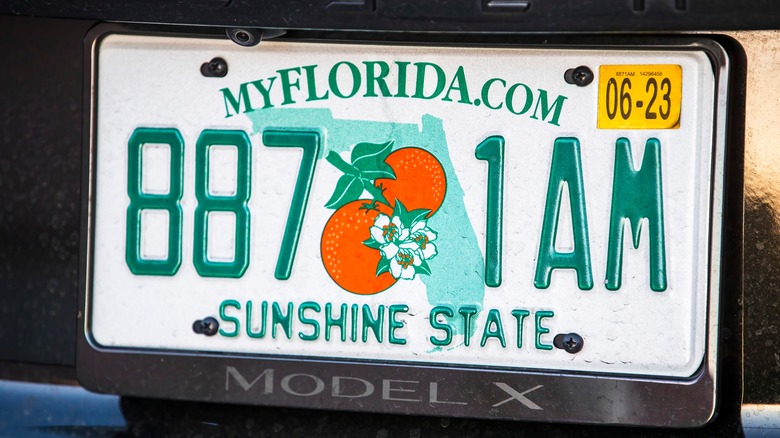7 Of The Weirdest Auto Laws In Florida
Driving laws exist to keep you and other drivers safe, and many of us know the most common auto laws by heart. Come to a complete stop at a stop sign. Obey right-of-way rules properly. Always wear your seatbelt. Don't go over the posted speed limit. The list could go on and on, and despite the massive number of these laws we have to learn, they quickly become ingrained in us. In addition to these helpful, almost intuitive driving laws, there are also quite a few that will make any driver pause and scratch their head. There are plenty of strange driving laws across the United States, but you'll find some of the weirdest auto laws in Florida.
The Sunshine State is frequently a source of entertaining news, like wild alligator antics in someone's backyard, coverage of a python roaming down a busy street, or some other puzzling headline involving a "Florida man." Many people have come to expect the strange and unexpected from Florida, but these seven specific auto laws may surpass your expectations.
You have to pay a parking fee when you tie an elephant to a parking meter
As crazy as it sounds, Florida supposedly used to have a law that you couldn't leave an elephant at a parking meter without first paying the parking fee, just like you would for a vehicle. This law isn't enforced anymore, and it's not clear when exactly it stopped being published among Florida auto laws, but there are theories about when the law may have originated.
According to an Orlando news outlet, this law may have started decades ago in 1917 or 1927 in Sarasota, Florida, located on the west coast of the state. John Ringling, an American entrepreneur best known for the Ringling Bros. traveling circus business, moved the "company's winter operations to Sarasota in 1927." Prior to this move, Ringling planned ahead and bought St. Armand's Key, an island in Sarasota Bay, in 1917. In between those dates, Ringling utilized elephants to help build the first causeway between the state and St. Armand's Circle, which is now a popular shopping spot for tourists. This elevated highway linking the island and the mainland is still called the John Ringling Causeway, or John Ringling Boulevard, to this day.
Cape Coral doesn't like you storing a couch in your garage
If you've ever had a dream of transforming your garage into an extra bedroom or a cool, relaxing getaway to watch movies or play video games, don't take up residence in Cape Coral, Florida. A current Cape Coral ordinance says that "indoor items that cannot be kept outside include household appliances, auto parts, indoor furniture, and building materials," and your garage counts as being outside.
In essence, this law is meant to keep the outside of your home from looking like a junkyard, with broken furniture or loose car parts cluttering your lawn or driveway. However, it technically means you could incur a fine for "storing" indoor furniture in your garage, whether it's permanent or temporary. That said, who's going to go around asking people to open their garage doors so they can see if you have furniture inside?
The city of Cape Coral also doesn't allow "inoperable or unregistered motor vehicles, boats, and boat trailers" to be stored on your property unless they're hidden away in an "enclosed structure." If you have a truck or a van with a ladder rack or utility box attached, you can't park it in front of your home. And as a blanket rule, you can't park on vacant lots or park on the grass, even if it's your own lawn.
It's illegal to park in an intersection or at the edge of a curbed street
Some laws sound like they shouldn't even be laws because of how much common sense they exude, but nonetheless, these laws exist because one person (or multiple people) did the thing that's since been made illegal. For the entire state of Florida, citizens must abide by a law that states you can't park your vehicle "[w]ithin an intersection." This same statute also says your vehicle can't be parked on sidewalks, in crosswalks, or "at the edge or curb of a street."
Aside from maybe parking at the edge of a street, all of these other parking limitations seem like no-brainers. Any sane driver also knows not to park in a bike lane, but a Florida statute needed to specifically outlaw this just in case. On the flip side, there are some road rules that seem obvious to most everyone, but some states actually don't have a law against them. As an example, there's one U.S. state that shockingly doesn't require adults to wear a seatbelt.
You can't park or drive on a grave in a cemetery
One place you'd inherently think you shouldn't park is on top of a grave, but apparently it needed to be written into law for multiple cities in Florida. The statute for Lake Mary, Florida, specifically says, "No person shall drive a vehicle over cemetery lots or upon cemetery lawns unless the grass area is designated as a parking area." The law goes even further to state, "no person shall drive or park any vehicle on any burial space." As far as bizarre driving laws in the U.S. go, this one is definitely at the top of the list. On top of it technically being illegal to park on a grave, it's just disrespectful, whether you know the person buried in the grave or not.
Another strange cemetery-related law in Florida is that, according to a few local law firms, it's apparently illegal to sell ice cream in a cemetery, which seems like the last place you'd want a tasty frozen treat.
Don't drive too slow or you may get a ticket
Most people know that driving over the posted speed limit will earn you a ticket in any state. Despite rumors surrounding Florida's updated laws, you won't run the risk of losing your car if you get caught speeding, but you can certainly face fines and possibly jail time or a suspended license, depending on how fast you were going. Although speeding is an obvious ticketable offense, driving too slow isn't. However, if you drive too slow in Florida, you may soon find yourself pulled over.
Driving slowly can disrupt the flow of traffic and be just as dangerous to other drivers as driving over the speed limit can be. If you're blocking other vehicles from driving along at the posted speed limit and posing a danger to other drivers on the road who may not be expecting you to be going that slow, an officer will likely intervene and give you a ticket or, at the very least, a warning.
You have to pay a $78 traffic fine if you hit a pedestrian with your vehicle
If you're searching for the weirdest local auto laws in Florida, you'll likely come across this gem: Hitting a pedestrian with your vehicle in Sarasota, Florida, will result in a $78 fine. A local law firm makes this claim as well, but cites sources from a link that no longer loads properly. When you look at local ordinances for Sarasota, there's not a law with this specific language in it anymore. The sites that list this fine as a consequence for hitting a pedestrian with your vehicle make it sound as though that's the only consequence you'll face. However, that's likely not true.
It's more possible that this rumor started with the simple information that a unique traffic fine amounting to only $78 needs to be paid if you hit a pedestrian with your vehicle, but it leaves out the important detail that this incident typically results in multiple different bills. You may be expected to pay civil penalties, potential criminal charges, possible medical bills depending on how badly you hit the pedestrian, and more.
It's illegal to leave your car running unattended for any period of time
No matter what the scenario is, it's illegal in Florida to leave your vehicle turned on without you inside it. Whether you're just running into a bakery, dropping off a package, or popping into your friend's house to pick something up, Florida law states that your car has to be turned off if you're going to leave it unattended for any amount of time. For a state with some of the least stringent window tint laws, this seems a bit extreme, but it's enforceable anywhere in the Sunshine State. This statute applies to most vehicles in the state, but there are a few exceptions.
Garbage trucks, delivery trucks, and emergency vehicles are understandably exempt from this law, as much of their job requires them to leave and come back to their vehicle multiple times throughout the day. Additionally, if you have a "vehicle that is started by remote control while the ignition, transmission, and doors are locked," you'll also be excluded from this statute. Despite common misconceptions about this technology, remote start isn't actually that bad for your car's engine, and it'll allow you to bypass this strange auto law in Florida.







